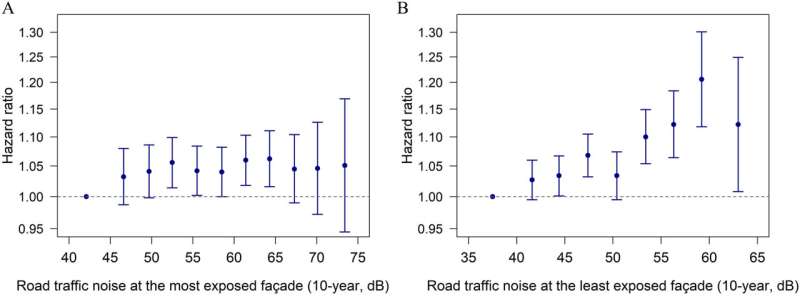This article has been reviewed according to Science X's editorial process and policies. Editors have highlighted the following attributes while ensuring the content's credibility:
fact-checked
peer-reviewed publication
proofread
Researchers find a link between traffic noise and tinnitus

If you live near a busy road, it may increase your stress levels and affect your sleep. When we are under stress and sleep poorly, we may be at a higher risk of developing tinnitus.
In a new study with data from 3.5 million Danes, researchers from the Department of Clinical Research and the Mærsk Mc-Kinney Møller Institute at the University of Southern Denmark (SDU) have found that the more traffic noise Danish residents are exposed to in their homes, the more they are at risk of developing tinnitus.
Tinnitus is most clearly manifested by annoying whistling tones in the ears, which are disturbing for many.
Risk increases with noise levels
It is the first time that researchers have found a link between residential traffic noise exposure and hearing-related outcomes.
"In our data, we have found more than 40,000 cases of tinnitus and can see that for every ten decibels more noise in people's home, the risk of developing tinnitus increases by six percent," says Manuella Lech Cantuaria, Ph.D., Assistant Professor at the Mærsk Mc-Kinney-Møller Institute and affiliated to the the Department of Clinical Research at SDU.
She and her colleague Jesper Hvass Schmidt, Associate Professor at the Department of Clinical Research and Chief Physician at Odense University Hospital (OUH) are concerned about the many health problems that traffic noise seems to cause. In 2021, they found a correlation between traffic noise and dementia.
"There is a need for more focus on the importance of traffic noise for health. It is alarming that noise seems to increase the risk of tinnitus, cardiovascular diseases and dementia, among other diseases," says Jesper Hvass Schmidt.
Tip of the iceberg
It is at hearing clinics, such as the one at OUH, where Jesper Hvass Schmidt works, that patients can get the diagnosis of tinnitus. But only the worst cases are referred from their own doctor or an otorhinolaryngologist . The high number of reported cases of tinnitus are probably only the tip of the iceberg, he believes.
"In general, about ten percent of the population experience tinnitus from time to time. It is associated with stress and poor sleep, which can be worsened by traffic noise, and here we have a potential cycle."
More studies are needed so that researchers can be sure that traffic noise causes tinnitus, and how this happens.
"But we know that traffic noise can make us stressed and affect our sleep. And that tinnitus can get worse when we live under stressful situations and we do not sleep well," Jesper Hvass Schmidt says.
Noise at night is worse
The researchers believe that noise at nighttime can be even worse for health
"It affects our sleep, which is so important for restoring both our physical and mental health. Therefore, it is worth considering whether you can do something to improve your sleep if you live next to a busy road," Manuella Lech Cantuaria says.
What to do
In the study, higher associations were found when noise was measured at the quiet side of their houses, that is, the side facing away from the road. This is where most people would place their bedroom whenever possible, therefore researchers believe this is a better indicator of noise during sleep.
"There are different things one can do to reduce noise in their homes, for example by sleeping in a room that does not face the road or by installing soundproof windows."
But not everyone has those options.
"It is therefore necessary that traffic noise is considered a health risk that must be taken into account in urban planning and political decisions, says Manuella Lech Cantuaria."
The findings are published in the journal Environmental Health Perspectives.
More information: Manuella Lech Cantuaria et al, Transportation Noise and Risk of Tinnitus: A Nationwide Cohort Study from Denmark, Environmental Health Perspectives (2023). DOI: 10.1289/EHP11248




















